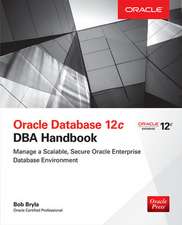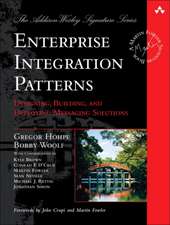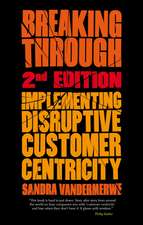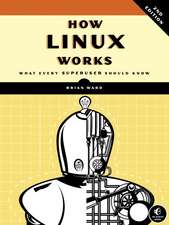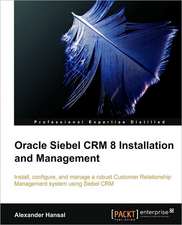Management 3.0
Autor Jurgen Appeloen Limba Engleză Paperback – 31 dec 2010
In many organizations, management is the biggest obstacle to successful Agile development. Unfortunately, reliable guidance on Agile management has been scarce indeed. Now, leading Agile manager Jurgen Appelo fills that gap, introducing a realistic approach to leading, managing, and growing your Agile team or organization.
Writing for current managers and developers moving into management, Appelo shares insights that are grounded in modern complex systems theory, reflecting the intense complexity of modern software development. Appelo's Management 3.0 model recognizes that today's organizations are living, networked systems; that you can't simply let them run themselves; and that management is primarily about people and relationships.
Management 3.0 doesn't offer mere checklists or prescriptions to follow slavishly: rather it deepens your understanding of how organizations and Agile teams work, and gives you tools to solve your own problems. Drawing on his extensive experience as an Agile manager and trainer, Appelo identifies the most valuable elements of Agile management, and helps you improve each of them. Coverage includes
- Getting beyond "Management 1.0" command hierarchies, and "Management 2.0" fads
- Understanding how complexity and non-linearity affect your organization-and why the best-laid plans so often fail
- Giving teams the care and feeding they need to grow on their own
- Defining boundaries and constraints, so teams can succeed in alignment with company goals
- Anticipating issues teams won't or can't resolve by themselves
- Sowing the seeds for a culture of software craftsmanship
- Keeping your people active, creative, motivated, and energized
- Helping teams develop crucial missing skills and disciplines
- Crafting organizational networks and communication flows that promote success
- Making change desirable-and making stagnation painful
- Implementing continuous improvement that actually works
Thoroughly pragmatic-and never trendy-Jurgen Appelo's Management 3.0 will help you bring greater agility to any software organization, team, or project.
Preț: 271.55 lei
Preț vechi: 339.44 lei
-20% Nou
51.97€ • 56.43$ • 43.65£
Carte disponibilă
Livrare economică 01-15 aprilie
Livrare express 15-21 martie pentru 43.31 lei
Specificații
ISBN-10: 0321712471
Pagini: 413
Dimensiuni: 178 x 232 x 25 mm
Greutate: 0.78 kg
Editura: Addison-Wesley Professional
Cuprins
Acknowledgments xxv
About the Author xxvii
Preface xxix
1 Why Things Are Not That Simple 1
Causality 2
Complexity 3
Our Linear Minds 5
Reductionism 7
Holism 8
Hierarchical Management 9
Agile Management 11
My Theory of Everything 12
The Book and the Model 13
Summary 14
Reflection and Action 14
2 Agile Software Development 17
Prelude to Agile 17
The Book of Agile 19
The Fundamentals of Agile 22
The Competition of Agile 24
The Obstacle to Agile 28
Line Management versus Project Management 28
Summary 30
Reflection and Action 31
3 Complex Systems Theory 33
Cross-Functional Science 34
General Systems Theory 35
Cybernetics 36
Dynamical Systems Theory 37
Game Theory 37
Evolutionary Theory 38
Chaos Theory 38
The Body of Knowledge of Systems 39
Simplicity: A New Model 41
Revisiting Simplification 44
Nonadaptive versus Adaptive 45
Are We Abusing Science? 46
A New Era: Complexity Thinking 48
Summary 50
Reflection and Action 50
4 The Information-Innovation System 51
Innovation Is the Key to Survival 52
Knowledge 54
Creativity 56
Motivation 58
Diversity 60
Personality 62
Only People Are Qualified for Control 64
From Ideas to Implementation 65
Summary 66
Reflection and Action 67
5 How to Energize People 69
Creative Phases 69
Manage a Creative Environment 72
Creative Techniques 74
Extrinsic Motivation 75
Intrinsic Motivation 78
Demotivation 79
Ten Desires of Team Members 80
What Motivates People: Find the Balance 83
Make Your Rewards Intrinsic 86
Diversity? You Mean Connectivity! 87
Personality Assessments 89
Four Steps toward Team Personality Assessment 90
Do-It-Yourself Team Values 92
Define Your Personal Values 94
The No Door Policy 95
Summary 97
Reflection and Action 97
6 The Basics of Self-Organization 99
Self-Organization within a Context 99
Self-Organization toward Value 101
Self-Organization versus Anarchy 102
Self-Organization versus Emergence 104
Emergence in Teams 106
Self-Organization versus Self-Direction
versus Self-Selection 107
Darkness Principle 108
Conant-Ashby Theorem 110
Distributed Control 111
Empowerment as a Concept 112
Empowerment as a Necessity 113
You Are (Like) a Gardener 115
Summary 117
Reflection and Action 118
7 How to Empower Teams 119
Donâ t Create Motivational Debt 119
Wear a Wizardâ s Hat 121
Pick a Wizard, Not a Politician 122
Empowerment versus Delegation 123
Reduce Your Fear, Increase Your Status 124
Choose the Right Maturity Level 125
Pick the Right Authority Level 127
Assign Teams or Individuals 131
The Delegation Checklist 132
If You Want Something Done, Practice Your Patience 133
Resist Your Managerâ s Resistance 134
Address Peopleâ s Ten Intrinsic Desires 136
Gently Massage the Environment 136
Trust 138
Respect 141
Summary 144
Reflection and Action 144
8 Leading and Ruling on Purpose 147
Game of Life 147
Universality Classes 149
False Metaphor 150
Youâ re Not a Game Designer 151
Butâ ¦Self-Organization Is Not Enough 152
Manage the System, Not the People 154
Managers or Leaders? 156
Right Distinction: Leadership versus Governance 156
Meaning of Life 158
Purpose of a Team 160
Assigning an Extrinsic Purpose 163
Summary 164
Reflection and Action 165
9 How to Align Constraints 167
Give People a Shared Goal 167
Checklist for Agile Goals 170
Communicate Your Goal 172
Vision versus Mission 174
Examples of Organizational Goals 176
Allow Your Team an Autonomous Goal 177
Compromise on Your Goal and Your Teamâ s Goal 178
Create a Boundary List of Authority 179
Choose the Proper Management Angle 180
Protect People 181
Protect Shared Resources 183
Constrain Quality 185
Create a Social Contract 186
Summary 188
Reflection and Action 188
10 The Craft of Rulemaking 191
Learning Systems 191
Rules versus Constraints 193
The Agile Blind Spot 196
Whatâ s Important: Craftsmanship 198
Positive Feedback Loops 200
Negative Feedback Loops 201
Discipline * Skill = Competence 204
Diversity of Rules 206
Subsidiarity Principle 208
Risk Perception and False Security 209
Memetics 211
Broken Windows 215
Summary 216
Reflection and Action 217
11 How to Develop Competence 219
Seven Approaches to Competence Development 221
Optimize the Whole: Multiple Levels 223
Optimize the Whole: Multiple Dimensions 224
Tips for Performance Metrics 227
Four Ingredients for Self-Development 229
Managing versus Coaching versus Mentoring 231
Consider Certification 233
Harness Social Pressure 235
Use Adaptable Tools 237
Consider a Supervisor 238
Organize One-on-Ones 241
Organize 360-Degree Meetings 242
Grow Standards 245
Work the System, Not the Rules or the People 246
Summary 247
Reflection and Action 248
12 Communication on Structure 249
Is It a Bug or a Feature? 250
Communication and Feedback 250
Miscommunication Is the Norm 253
Capabilities of Communicators 254
Network Effects 258
Tuning Connectivity 260
Competition and Cooperation 262
Groups and Boundaries 264
Hyper-Productivity or Autocatalysis 266
Pattern-Formation 268
Scale Symmetry: Patterns Big and Small 270
How to Grow: More or Bigger? 272
Summary 274
Reflection and Action 274
13 How to Grow Structure 275
About Environment, Products, Size, and People 275
Consider Specialization Firstâ ¦ 278
â ¦And Generalization Second 279
Widen Peopleâ s Job Titles 281
Cultivate Informal Leadership 283
Watch Team Boundaries 284
The Optimal Team Size Is 5 (Maybe) 286
Functional Teams versus Cross-Functional Teams 288
Two Design Principles 290
Choose Your Organizational Style 292
Turn Each Team into a Little Value Unit 294
Move Stuff out to Separate Teams 295
Move Stuff up to Separate Layers 299
How Many Managers Does It Take to Change an Organization? 301
Create a Hybrid Organization 302
The Anarchy Is Dead, Long Live the Panarchy 303
Have No Secrets 305
Make Everything Visible 307
Connect People 308
Aim for Adaptability 308
Summary 309
Reflection and Action 310
14 The Landscape of Change 313
The Environment Is Not â Out Thereâ 313
The Fear of Uncertainty 315
Laws of Change 317
Every Product Is a Successâ ¦Until It Fails 319
Success and Fitness: Itâ s All Relative 321
How to Embrace Change 321
Adaptation, Exploration, Anticipation 322
The Red Queenâ s Race 325
Can We Measure Complexity? 327
Are Products Getting More Complex? 328
The Shape of Things: Phase Space 331
Attractors and Convergence 332
Stability and Disturbances 334
Fitness Landscapes 335
Shaping the Landscape 337
Directed versus Undirected Adaptation 339
Summary 340
Reflection and Action 341
15 How to Improve Everything 343
Linear versus Nonlinear Improvement 345
Know Where You Are 347
Travel Tips for Wobbly Landscapes 348
Change the Environment, Summon the Mountain 350
Make Change Desirable 353
Make Stagnation Painful 354
Honor Thy Errors 355
The Strategy of Noise 356
The Strategy of Sex 359
The Strategy of Broadcasts 360
Donâ t Do Copy-Paste Improvement 362
Some Last Practical Tips for Continuous Change 364
Keep on Rolling 366
Summary 367
Reflection and Action 367
16 All Is Wrong, but Some Is Useful 369
The Six Views of Management 3.0 369
Yes, My Model Is â Wrongâ 371
But Other Models Are â Wrong,â Too 373
The Fall and Decline of Agilists 376
The Complexity Pamphlet 377
Summary 380
Reflection and Action 380
Bibliography 381
Index 393
Descriere
Pragmatic Insights for Successfully Managing Your Unique Agile Team or Organization
In many organizations, management is the biggest obstacle to successful Agile development. Unfortunately, reliable guidance on Agile management has been scarce indeed. Now, leading Agile manager Jurgen Appelo fills that gap, introducing a realistic approach to leading, managing, and growing your Agile team or organization.
Writing for current managers and developers moving into management, Appelo shares insights that are grounded in modern complex systems theory, reflecting the intense complexity of modern software development. Appelo's Management 3.0 model recognizes that today's organizations are living, networked systems; that you can't simply let them run themselves; and that management is primarily about people and relationships.
Management 3.0 doesn't offer mere checklists or prescriptions to follow slavishly: rather it deepens your understanding of how organizations and Agile teams work, and gives you tools to solve your own problems. Drawing on his extensive experience as an Agile manager and trainer, Appelo identifies the most valuable elements of Agile management, and helps you improve each of them. Coverage includes
- Getting beyond "Management 1.0" command hierarchies, and "Management 2.0" fads
- Understanding how complexity and non-linearity affect your organization-and why the best-laid plans so often fail
- Giving teams the care and feeding they need to grow on their own
- Defining boundaries and constraints, so teams can succeed in alignment with company goals
- Anticipating issues teams won't or can't resolve by themselves
- Sowing the seeds for a culture of software craftsmanship
- Keeping your people active, creative, motivated, and energized
- Helping teams develop crucial missing skills and disciplines
- Crafting organizational networks and communication flows that promote success
- Making change desirable-and making stagnation painful
- Implementing continuous improvement that actually works
Thoroughly pragmatic-and never trendy-Jurgen Appelo's Management 3.0 will help you bring greater agility to any software organization, team, or project.
Recenzii
– Jim Highsmith, Executive Consultant, ThoughtWorks, Inc., www.jimhighsmith.com, Author of Agile Project Management
“ An up-to-the-minute, relevant round-up of research and practice on complexity and management, cogently summarized and engagingly presented.”
–David Harvey, Independent Consultant, Teams and Technology
“ Management 3.0 is an excellent book introducing agile to management. I’ve not seen any book that comes near to what this book offers for managers of agile teams. It’s not only a must read, it’s a must share.”
–Olav Maassen, Xebia
“ If you want hard fast rules like ‘if x happens, do y to fix it’ forget this book. Actually forget about a management career. But if you want tons of ideas on how to make the work of your team more productive and thereby more fun and thereby more productive and thereby more fun and…read this book! You will get a head start on this vicious circle along with a strong reasoning on why the concepts work.”
–Jens Schauder, Software Developer, LINEAS
“ There are a number of books on managing Agile projects and transitioning from being a Project Manager to working in an Agile setting. However, there isn’t much on being a manager in an Agile setting. This book fills that gap, but actually addresses being an effective manager in any situation. The breadth of research done and presented as background to the actual concrete advice adds a whole other element to the book. And all this while writing in an entertaining style as well.”
–Scott Duncan, Agile Coach/Trainer, Agile Software Qualities
“ Don’t get tricked by the word ‘Agile’ used in the subtitle. The book isn’t really about Agile; it is about healthy, sensible and down-to-earth management. Something, which is still pretty uncommon.”
–Pawel Brodzinski, Software Project Management
“ When I first met Jurgen and learned he was writing a book based on complexity theory, I thought, ‘That sounds good, but I’ll never understand it.’ Books with words like entropy, chaos theory, and thermodynamics tend to scare me. In fact, not only did I find Management 3.0 accessible and easy to understand, I can [also] apply the information immediately, in a practical way. It makes sense that software teams are complex adaptive systems, and a relief to learn how to apply these ideas to help our teams do the best work possible. This book will help you whether you’re a manager or a member of a software team”.
–Lisa Crispin, Agile Tester, ePlan Services, Inc., author of Agile Testing
“ This book is an important read for managers who want to move beyond ‘managing by hope’ and understand the underpinning of trust, motivation, and the complexity that exists in nearly every team out there.”
–Cory Foy, Senior Consultant, Net Objectives
“ This book is a very accessible compendium of team management practices based on scientific research. It’s not only the tremendous value in each page of this book, but also Jurgen’s typical sense of humor that turns this book into a pleasant read.”
–Ruud Cox, Test Manager, Improve Quality Services
“ The very heart of software development is to get people to recognize they are in a complex system that should be managed accordingly. Management 3.0 addresses both the recognition and the concomitant transformative aspects. By so doing, Jurgen Appelo provides a bridge between theory and practice that has so far been considered too far away.”
– Israel Gat, Founder, The Agile Executive, author of The Concise Executive Guide to Agile
“ If you really want to know about Agile management, read Jurgen’s book. He explains why looking for results is key to involving the team and for a great outcome. As Jurgen says, management is not simple and this book explains why. With humor and pragmatism, Jurgen shows you how you can think about management.”
– Johanna Rothman, Consultant, Rothman Consulting Group, Inc., author of Manage It!
“ In this book, Jurgen does a great job of explaining the science behind complexity and how Agile management methods have arisen from the need to manage in complex, dynamic, and unpredictable circumstances. If you’re leading Agile development teams and interested in developing your management skills, this book is a must-read.”
–Kelly Waters, Blogger, Agile Development Made Easy!
“ I firmly believe that Management 3.0 will become the ‘Bible’ of Agile management books in the decade ahead.”
– Ed Yourdon, IT Management/Software Consultant, Nodruoy, Inc., author of Death March
“ This book is not written for those who want a quick fix. This book is written for serious students who have a passion and love for management. This book is written for management craftsmen.”
–Robert C. Martin, Owner, ObjectMentor, Inc., author of Clean Code
“ Every 21st century Agile (or non-Agile) manager needs to read Jurgen Appelo’s Management 3.0. With an engaging and accessible style, Appelo outlines current theories from complexity science, management, leadership, and social systems [and] then pulls them all together with practical examples. Then he throws in reflective questions to assist managers in applying it all to their current situations. Whenever I work with a manager, executive, or leadership team, I’ll recommend this book.”
– Diana Larsen, Consultant, FutureWorks Consulting LLC, co-author of Agile Retrospectives
“ Jurgen takes his readers on a wide-ranging romp through system theory, complexity theory, management theory–and distills it for practical application. His book will help managers think about their work differently and expand their options for effective action in the workplace.”
– Esther Derby, Consultant, Esther Derby Associates, Inc., co-author of Behind Closed Doors: Secrets of Great Management
“ Jurgen managed to write a book that links the tons of books he has read. Although there were a few moment I did not agree with him, I loved the way this book challenged my thinking. This is the perfect book if you want to know how to create your own answers in this complex world.”
–Yves Hanoulle, Agile Coach, PairCoaching.net
“ Management 3.0 brings together the best thinking in the fields of complex adaptive systems, Agile management, and Lean product delivery to suggest a pragmatic framework for effective management in the 21st century. To be successful in the face of rapidly changing market conditions, we must create organizations that enable our people to adapt, with a minimal amount of oversight and direction. Management 3.0 gives us a roadmap for leading teams in the face of profound uncertainty. Jurgen has made a significant contribution to the field of Agile management and leadership.”
–Mike Cottmeyer, Agile Coach, LeadingAgile
“ Too many Agile practitioners ignore the realities of the real world. But in the real world Agile projects must be managed, directed, and moved forward. This benefits both the company and the team, and Jurgen has done a great job of bringing those practices into focus in a real and practical way. If you’re involved with Agile software in a shop of any size, or if you’re a manager (or executive) who’s seen the benefits of Agile and want to bring them into your shop, you owe it to yourself to read this book.”
–Jared Richardson, Agile Coach, Logos Technologies, co-author of Ship It!
“ I had felt quite well-equipped to manage teams adopting an Agile software development approach, having read works like Managing Transitions, Leading Change, and Behind Closed Doors, until I began to read Management 3.0. Appelo’s compendium works at a variety of levels: It helps novice managers with a diverse collection of easy-to-apply models, it helps experienced managers see what they need to unlearn, and I assume it will help even expert managers adapt to contemporary styles of leadership and governance. Management 3.0 has opened my eyes to the vast world of modern-day management whose surface I see I have only scratched so far, and I look forward to Appelo’s work guiding me along as I learn.”
–J.B. Rainsberger, Consultant, Coach, Mentor, jbrains.ca, author of JUnit Recipes
“ Software projects are complex living systems; knowledge loss happens as soon as you manage them. Make your life easier, minimize the loss: Read this book!”
–Jacopo Romei, Agile Coach, co-author of Pro PHP Refactoring
“ For people who ‘get’ the message, this book may prove to be as valuable as Darwin’s book On the Origin of Species.”
–Florian Hoornaar, Entrepreneur, Octavalent
Notă biografică
Jurgen Appelo is a writer, speaker, trainer, developer, entrepreneur, manager, blogger, reader, dreamer, leader, and freethinker. And he’s Dutch, which explains his talent for being weird.
After studying software engineering at the Delft University of Technology, and earning his Master’s degree in 1994, Jurgen busied himself either starting up or leading a variety of Dutch businesses, always in the position of team leader, manager, or executive.
Jurgen’s most recent occupation was CIO at ISM eCompany, one of the largest e-business solution providers in The Netherlands. As a manager, Jurgen has experience in leading software developers, development managers, project managers, quality managers, service managers, and kangaroos, some of which he hired accidentally.
He is primarily interested in software development and complexity theory, from a manager’s perspective. As a writer, he has published papers and articles in many magazines, and he maintains a blog at www.noop.nl. As a speaker, he is regularly invited to talk at seminars and conferences.
Last but not least, Jurgen is a trainer, with workshops based on the Management 3.0 model. His materials address the topics of energizing people, empowering teams, aligning constraints, developing competence, growing structure, and improving everything.
However, sometimes he puts all writing, speaking, and training aside to do some programming himself, or to spend time on his ever-growing collection of science fiction and fantasy literature, which he stacks in a self-designed book case that is four meters high.
Jurgen lives in Rotterdam (The Netherlands)–and sometimes in Brussels (Belgium)–with his partner Raoul. He has two kids and an imaginary hamster called George.
Textul de pe ultima copertă
In many organizations, management is the biggest obstacle to successful Agile development. Unfortunately, reliable guidance on Agile management has been scarce indeed. Now, leading Agile manager Jurgen Appelo fills that gap, introducing a realistic approach to leading, managing, and growing your Agile team or organization.
Writing for current managers and developers moving into management, Appelo shares insights that are grounded in modern complex systems theory, reflecting the intense complexity of modern software development. Appelo’s Management 3.0 model recognizes that today’s organizations are living, networked systems; and that management is primarily about people and relationships.
Management 3.0 doesn’t offer mere checklists or prescriptions to follow slavishly; rather, it deepens your understanding of how organizations and Agile teams work and gives you tools to solve your own problems. Drawing on his extensive experience as an Agile manager, the author identifies the most important practices of Agile management and helps you improve each of them.
Coverage includes
• Getting beyond “Management 1.0” control and “Management 2.0” fads
• Understanding how complexity affects your organization
• Keeping your people active, creative, innovative, and motivated
• Giving teams the care and authority they need to grow on their own
• Defining boundaries so teams can succeed in alignment with business goals
• Sowing the seeds for a culture of software craftsmanship
• Crafting an organizational network that promotes success
• Implementing continuous improvement that actually works
Thoroughly pragmatic–and never trendy–Jurgen Appelo’s Management 3.0 helps you bring greater agility to any software organization, team, or project.

